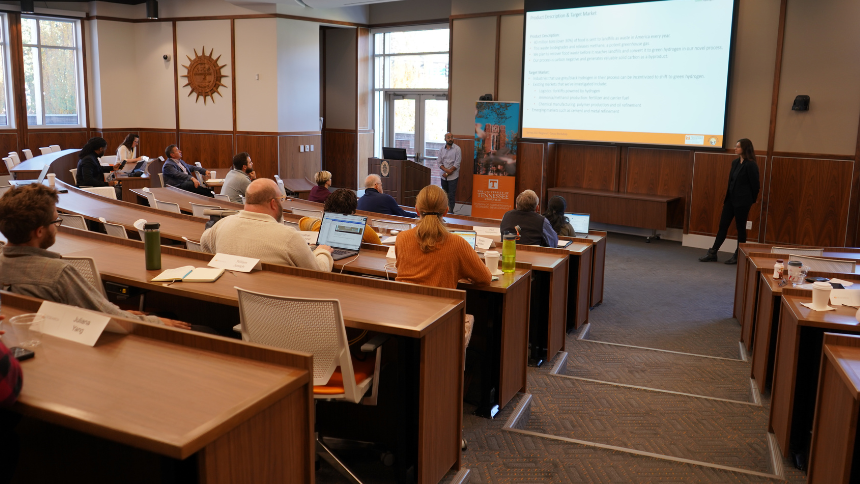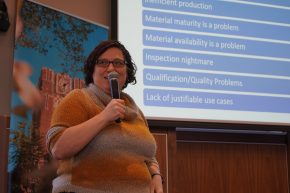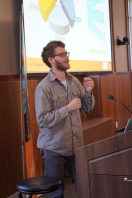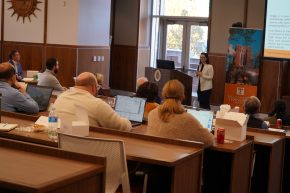
From labs to the marketplace | Regional I-Corps program wraps up
Each research and entrepreneurial team was encouraged to engage with at least 20 potential customers.
The regional Mid-South I-Corps program is making waves in the innovation landscape by helping researchers and entrepreneurs turn their groundbreaking ideas into market-ready products.
This year’s program was spearheaded by Rob Coleman, the Director of the Office of Research, Innovation, and Economic Development (ORIED) at the University of Tennessee, Knoxville (UTK). The goal of this regional initiative is to bridge the gap between the research community and the marketplace.

The three-week Mid-South I-Corps program is part of the National Science Foundation’s I-Corps initiative, which seeks to translate innovative ideas “out of the lab” and into the hands of consumers. This mission was accomplished through an intensive process of customer discovery, which challenged teams to identify pain points, market potential, costs, and customer desires. It also helped them think about how to commercialize their technologies.
Each research and entrepreneurial team was encouraged to engage with at least 20 potential customers. They were tasked with identifying existing problems within the marketplace, gaining insights into current customer experience shortcomings, identifying potential customers for their proposed product, and gauging the perceived value of their innovation.
While not every team managed to complete 20 conversations within the three-week timeframe, the consensus among participants who reported on their experience at an event Monday in the Student Union building at UTK was that these interactions provided invaluable external perspectives on the marketplace and the potential value of their products.
Here’s a breakdown of the research/entrepreneurial teams that participated:
- Neuromorphic Solutions: Charles Rizzo and Bryson Gullett are focused on creating energy-efficient and compact AI systems suitable for powerful data processing in customer-embedded applications.
- Wireless Sensing: Joshua Tyler is working on Advanced Waveform Resampling (AWR), a novel technique that significantly enhances audio quality without increasing data size. Their goal is to appeal to studios and artists who can endorse the product’s validity.
- Encore Scores: Hillary Herndon, Nathan Fleshner, and Charles Cao are in the process of developing a program aimed at resolving common issues related to printed sheet music and existing digital platforms for music reading. They conducted 30 interviews, and found a need for more collaborative virtual workspaces, and manipulatable music for sheet music.
- Cryosalt: Tao Wu, Julianna Yang, Megan Stone, and Min Li are pioneering the use of bio salts to safeguard bio-products. Their cryoprotectant is safe for consumption and offers an effective alternative to toxic chemicals. The team said it has the potential to replace the industry-standard, dimethyl sulfoxide. They conducted 20 interviews.
- NorDIC Lab: Ahmed Aziz, Shamiul Alam, and Jack Hutchins developed unique superconducting reconfigurable cryotons known for their exceptional energy efficiency. An interview with a customer led to the signing of an NDA with Raytheon to assess the technology’s suitability for space applications, demonstrating the value of the customer discovery process.
- Orange SODA (Single Use On Demand Atomization): Andrew Dickerson has designed a nasal vaccine delivery device inspired by burst-pack microjets found on citrus peels. He conducted six in-person interviews and is actively working on developing the intellectual property to bring it to the market.
- Green Hydrogen: Mirka Mandich and Saurabh Pethe are pioneers in converting food waste into green hydrogen. Additionally, their innovation offers green tax benefits for participating companies and organizations.

Will Joseph, Strat Surveys - Strat Surveys: Will Joseph specializes in Stratigraphy Terrain Research and Technologies (STRAT). He provides non-invasive solutions for mapping subsurface features of interest across various environments. He conducted 22 customer interviews and found the current process is excessively time-consuming.
- Z18 Engineering: Bing Cao is introducing new technology for removing PFAS from waterways, with a focus on airport and military operations. Customers have expressed concerns about health risk analysis, which has taken this team down another route of research.
- Skuld LLC: Sarah Jordan is in Tennessee for the Innovation Crossroads, through Oak Ridge National Laboratory (ORNL). She is developing 3D printing equipment for metals. They are utilizing a new hybrid additive manufacturing process called AMEC. They conducted 30 interviews and identified the main pain point in the market is 3D printing companies overpromising and underdelivering. Their product plan is to market to foundries that are unable to afford half-million-dollar systems, and instead provide them a $30,000 model.
- Platform Drug Delivery Technologies: Elizabeth (Libby) Barker’s innovation, Amygel, is a novel injectable hydrogel designed for localized chemotherapy delivery to solid tumors. Using Amygel increases drug concentration at the target site. She is already working with some hospitals to test the gel’s effectiveness.
 Key takeaways from the customer discovery experience include the importance of remaining flexible, the inevitability of surprises, and the necessity of letting the customer identify the pain points. Innovation doesn’t happen in a vacuum, and assumptions about an idea must be identified and validated. Customer pain points may differ from what was initially expected, requiring adaptability and open-mindedness. Finally, while getting customers on the phone can be challenging, it’s an essential step in gathering information to refine and improve innovative projects.
Key takeaways from the customer discovery experience include the importance of remaining flexible, the inevitability of surprises, and the necessity of letting the customer identify the pain points. Innovation doesn’t happen in a vacuum, and assumptions about an idea must be identified and validated. Customer pain points may differ from what was initially expected, requiring adaptability and open-mindedness. Finally, while getting customers on the phone can be challenging, it’s an essential step in gathering information to refine and improve innovative projects.
The Mid-South I-Corps program continues to empower and inspire the regional research community, ensuring that groundbreaking ideas don’t remain confined to the lab but find their way to the marketplace, where they can make a real impact. With such promising projects and dedicated teams, the future of innovation in the Mid-South region looks bright.
Like what you've read?
Forward to a friend!

